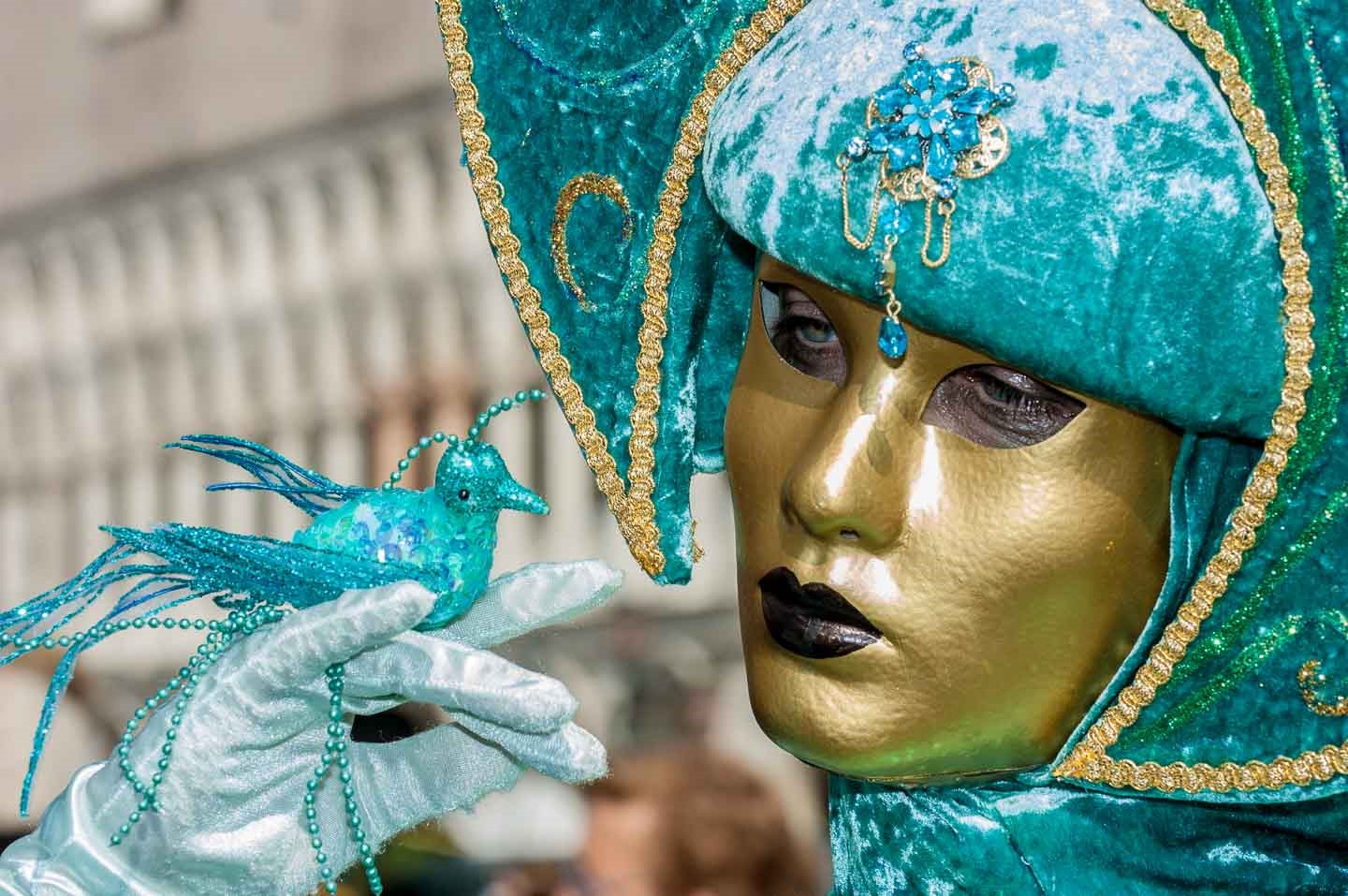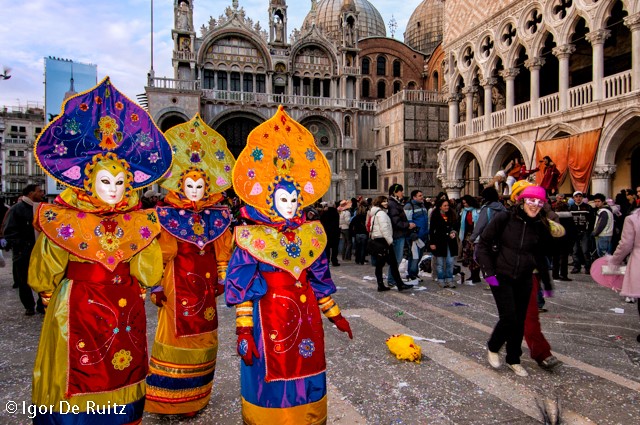
When we think next to the Carnival, all of us immediately recall images of joyful
people with striking costumes, that go wild on the roads dancing samba. Undoubtedly
the carnival to which we land with the thoughts is the Rio De Janeiro one, certainly
the most famous of the world. But the carnival of Rio is very “young”, it’s an inheritance
of the first Portuguese colonizers that imported it from Europe along with the tradition
of the Italian masks. Not everybody knows that the most ancient carnival of the
world is instead Italian, and it’s the up-till-now famous Carnevale di Venezia:
the oldest Venetian document that references it, it’s dated 2nd May 1268 (more than
2 centuries before the discovery of the Americas). At that time, Venice was definitely
the most amusing place of Europe, the carnival in fact lasted even 3 months; Venice
was also in a certain sense, the most democratic place, the mask allowed everyone,
also the low classes, to mix with the noble rank, protected by their disguises.


It must but noticed that the tradition of Venetian masks was not only limited
to the Carnival, but men and women used to mask themselves frequently: masks were
used, for example, to protect the gamblers from the indiscreet looks (especially
from the ones of their creditors), were used by noblemen Barnabotti (poor
patricians) in order to beg at the road corners or were used by women, for secret
encounters with their lovers.
To understand how libertine was the Venetia of the Serenissima, it’s sufficient
to read one of the numerous documents regarding masquerades, promulgated to keep
the morality of the citizens: a decree of 22nd February 1339 forbade the Venetians
to go masked round the town by night; another decree of 24th January 1458 forbade
the men to get into convents, masked as women, in order to do “multas inhonestates”
(Author’s note: even if do not understand Latin, you can imagine of what we’re speaking
about). The men who transgressed to these rules had to make 2 years in jail, had
to serve for 18 months the Republic in galley-rowing (with ankles fettered) and
not only that, a 500 lire fine to the Consiglio dei Dieci (Council of the
10). For women it went worse, the prostitutes, that were found masked, were whipped
from St Mark's all the way to Rialto bridge, were held to public ridicule in St
Mark's square, were banned from entering the territory of the Venetian Republic
for 4 years and, as it was not enough, had to pay a 500 lire fine to the Consiglio
dei Dieci. being even forbidden during the first Austrian Government.
Today obviously things are changed, if someone masks himself by woman and goes
into a convent, probably the nuns would call the police (or perhaps not, I have
never tried, if someone does it, let me know).
Although countless carnivals exist around the globe, the Carnival of Venice is unique
in its kind, nowhere it is possible to breath the same style and the noble climate,
the masks that circulate round the town are the same ones that were used centuries
ago.
It does not exist a rule for the dress, but nobody would imagine to go to Venice
dressed as Spiderman. Even if in your closet you haven’t the ancient costume of
your Venetian forefathers, to get hold a dress proper to the event is very easy,
the tradition of the Mascarieri (mask craftsmen) is strong still today, think
that in Venice there are more than 400 stores that sell or rent costumes all the
year. The Venetian disguise par excellence is the bauta, worn by men and
women: it consists of a black cloak and a tricorn hat, plus a white mask completely
concealing the wearer’s face (the ones used in the Stanley Kubrick's movie Eyes
Wild Shut).
I asked Mrs. Valentina, owner of a beautiful store of masks in the quarter of
Dorsoduro (than exports in Sidney through a distributor named “A Touch of Venice”),
how much could cost to rent a complete costume: “The rent of a costume starts from
300 euro, while the mask for hygienic reasons cannot be rented but has to be bought:
we speak in this case of a cost around 40 euro”.
If these figures scare to you, they are nothing to the comparison of how much can
cost one masked society evening: you could decide to take a gondola (150
euro) to go to the theatre (not less than 250 euro), or to be guest in some exclusive
Venetian palace in order to participate to a masked ball (let’s say 350 euro). The
climate that can you experience in these particular parties (there are a lot of
them) is extraordinary, you are immediately transported back in the past and for
a night anyone will be able to identify herself in a Venetian noblewoman or a second
Casanova. Among all I want to cite the famous Ballo del Doge, one of the
most famous and exclusive masked gala of the world, it is considered from the international
press the maximum expression of the Venetian Baroque; in collaboration with directors,
scenographers, artists and famed chefs, the dinner and accurate spectacle are an
experience that everybody should try at least once in his life. Under the historical
costume (obligatory) of the guests, it is very easy that famous personages and crowned
heads hide themselves, but obviously you will never come to know it.
Do you want to see more photos?
We have many more.
Visit our Pinterest page pressing the button here below and then follow us to keep in touch!
The visitor that comes to the Carnival of Venice for the first time and consults
the program of the event, could find herself confused from the multitude of shows,
gala evenings and masked balls. Since nobody of us has the gift of the ubiquity,
soon it becomes clear that it won’t be possible to see all. No panic, neither it
is obligatory to participate to these expensive exclusive parties, nor to put on
a fancy-dress, you can however be amused walking on the roads observing the wonderful
masks that parade, stopping from time to time in some campo (square) in order
to assist to the numerous free plays that bring to the scene the Commedia dell’Arte
or concerts of classical music. When you want to rest, what’s better than to
allow yourself a famous Florian coffee in the homonymous ancient place in St Mark's
square and to enjoy, sitting at the table, the parade of the most beautiful costumes
and the exhibitions that are put on the enormous prepared theatre stage.
One of the things that you cannot miss is “The Flight of the Angel” or, like it
was called in the past, “The Flight of the Turk”. It seems that in the mid-1500
a young Turkish acrobat was protagonist of an enterprise that astounded the citizenship,
he walked on a rope, with the help of a balancing rod, from a boat all the way up
to the campanile of Saint Mark. It became a tradition and every year it marks the
beginning of the carnival. But I have to inform you that it is not always the same,
sometimes professional acrobats execute incredible things (in the 1680 Sante da
Ca' Lezze succeeded to climb riding a horse), other times the show is limited to
the descent of one big wooden dove. During the last few years it has become a custom
to lower from the bell tower a sportstart or a show star, that throws confetti over
the heads of the spectators. It’s anyhow a very suggestive show.

I conclude giving you the last advise: it is very easy during these dances, in
the great game of transgression and seduction, to yield yourself to the glamour
of some masked beauty, charmed by the blue eyes that you glimpse behind the mask;
but remember the tale of the nuns, under to those blue eyes, a beautiful pair of
moustaches could hide.

Did you like the article?
Subscribe to our free newsletter and stay up to date on digital strategies.